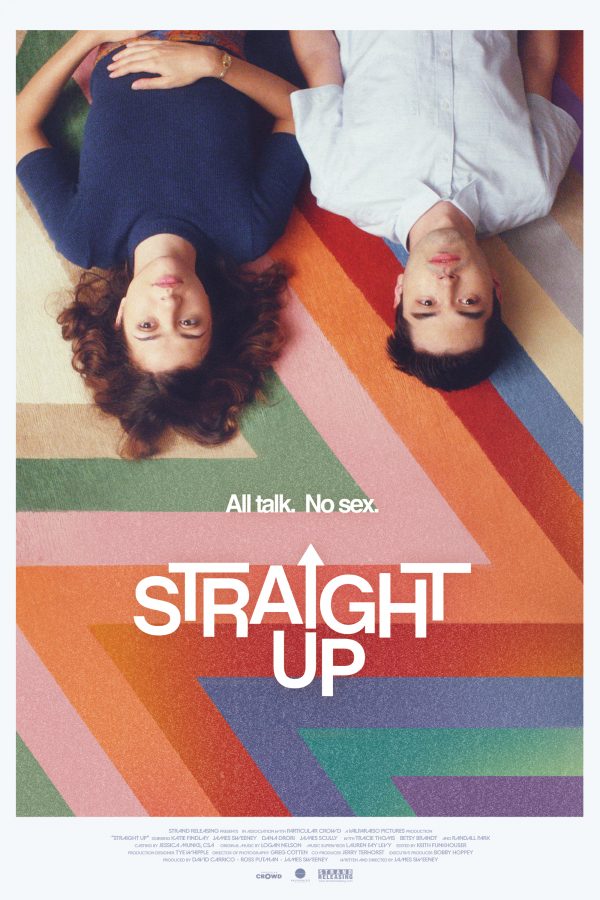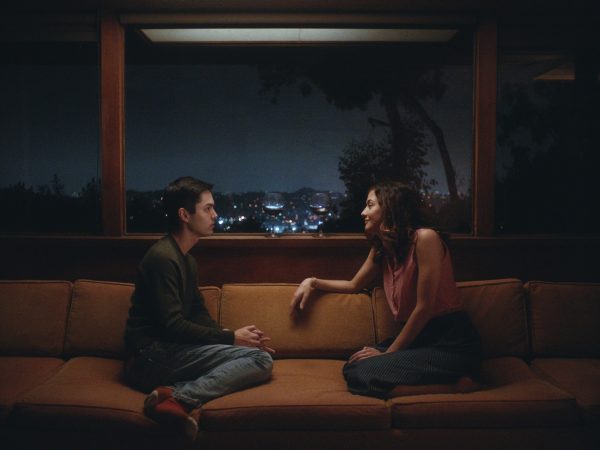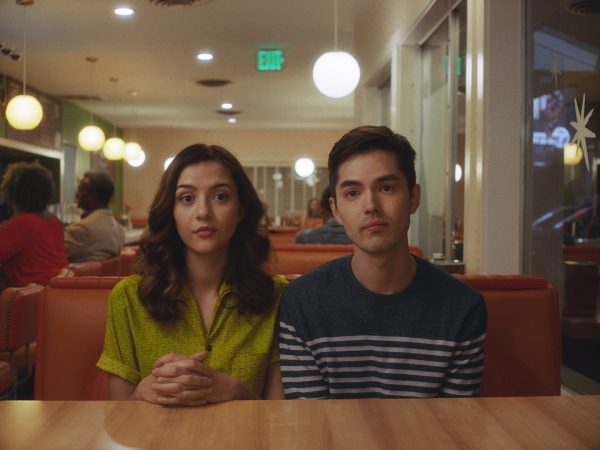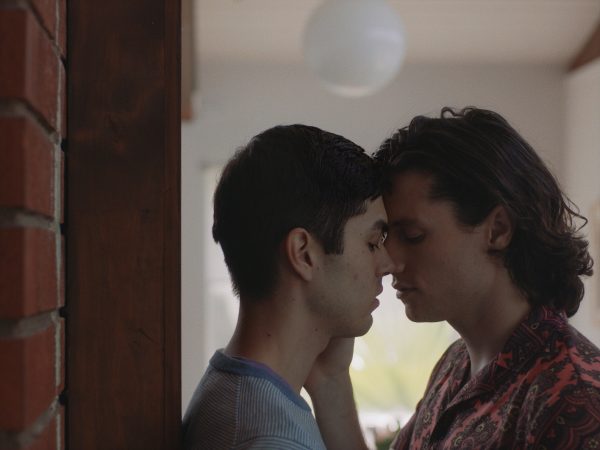‘Straight Up’ pushes us to face our personal truths
“Straight Up”(2020). Cast: James Sweeney, Katie Findlay, Brendan Scannell, Dana Drori, Tracie Thoms, Betsy Brandt, Randall Park, Josh Diaz, Grace Song, Logan Huffman. Director: James Sweeney. Screenplay: James Sweeney. Web site. Trailer.

Blissful ignorance may pacify us when the truth seems to be too painful to face. But is it a suitable solution for the long term? When we see what we’re missing out on, can we realistically keep up a front pretending that what’s absent from our lives isn’t all that important? So it is for a sexually confused young man as he struggles to find himself and grow comfortable with his true nature in the rapid-fire role-switching comedy, “Straight Up.”
Todd (James Sweeney) is having some troubles sorting out his life. The twenty-something Angelino computer coder and house sitter is pervasively dissatisfied with his circumstances, and he’s not exactly sure what to do about it. The loquacious, fast-talking, persnickety, hyperactive critic of virtually every aspect of daily living is beset by a host of OCD-driven neuroses that constantly leave him feeling unsettled, unsure of himself and unclear about what his future holds. And, to top it all off, he’s quite obviously gay, something that troubles him deeply, his relentless OCD tics having caused him to become uncomfortable with many aspects of the gay male lifestyle, from its cultural trappings to the mechanics of its sexual components.
To address these issues, Todd regularly sees a counselor, Dr. Larson (Tracie Thoms), to help him sort out these matters, with somewhat mixed results. He also occasionally socializes with his friends Jerry (Brendan Scannell) and Meg (Dana Drori), his only close companions, who often serve as confidantes and sounding boards for his troubles. Once in a while he also begrudgingly visits his wealthy, somewhat eccentric, highly opinionated parents, Topanga (Betsy Brandt) and Wallace (Randall Park), who generously foot the bill for his therapy sessions. Beyond that, however, Todd is a loner who seems most comfortable when in his own company, despite the fact that loneliness nearly always sets in if he adheres to that routine too rigorously.
While visiting with Jerry and Meg over coffee one day, Todd makes an important announcement. After having given his circumstances much thought, and considering his ongoing hesitancy to embrace the gay lifestyle, he proposes the notion that perhaps his rampant discomfort is driven by the fact that he’s really a latent heterosexual at heart. Jerry, who is himself gay, and Meg, who has a bevy of gay male friends, are more than a little skeptical. They want to be supportive of their friend, but they politely scoff at this idea, trying to convince Todd that he’s deluding himself and that he should discuss his idle speculation with Dr. Larson. But Todd counters that, since he’s never dabbled in the courting rituals of the straight world, maybe he has yet to discover something about himself that he’s never had the opportunity to explore. And, with that realization (or is it rationalization?), he decides to give heterosexuality a whirl to see where it takes him.
Todd soon takes his first tentative steps toward this goal by paying a visit to a dance club frequented by single women, an adventure that doesn’t go well, especially when they introduce him to their gay male friends. And, when he does meet women who are interested in him, the experiences don’t turn out as hoped for; in fact, they only serve to reinforce some of his neuroses about the mechanics of sex, driving him even further away from pursuing episodes of intimacy.
Not long thereafter, however, circumstances take a dramatic turn. Through a chance encounter in a library, Todd meets Rory (Katie Findlay), an aspiring actress who’s having little success advancing her career and is forced into taking unsatisfying jobs just to keep a roof over her head. This lack of success is driven in large part by her quirky persona, one that turns off directors during auditions and casting calls (not to mention those employers who hire her for those stop-gap money-making gigs). And, as a Tinsel Town transplant who has few friends and almost no regular professional colleagues, she’s by herself a lot.

That changes when Rory meets Todd. In many regards, the eccentricities that characterize Rory’s personality, but that also tend to isolate her, are carbon copies of Todd’s traits. They begin incessantly chattering away with one another almost from the moment they meet, completing one another’s sentences and seamlessly conversing about an array of obscure, esoteric and intellectual topics. In short, they’re a perfect match for one another, even when it comes to their preference for companionship over sexual interaction.
Before long, Todd and Rory are an item, even if they bring new meaning to the notion of “odd couple.” Needless to say, this development baffles Jerry, Meg and Dr. Larson while delighting Topanga and Wallace. They move in together and appear blissfully happy – or is it blissfully ignorant?
As time passes and Todd and Rory begin to talk themselves out, the growth of their relationship begins to stall. Their attempts at exploring new horizons, such as the once-avoided sexual components, don’t go well, either. And, when situations arise where the true nature of Todd’s sexual orientation get put to the test, they cause stress for both partners. Quarrels ensue, and Rory begins questioning their future. Are they indeed a couple or just two people playing house? Is there enough to maintain this connection going forward, or will Todd and Rory have to address some difficult decisions and adjustments? What’s more, if changes become necessary, what would that do to each of them as individuals? Much is at stake, and it’s unclear how that will play out or what the consequences will be.
Facing the truth is sometimes difficult. We may not like what we see, and we might go out of our way to dodge it, perhaps even devising elaborate justifications for such avoidance. In the short term, these rationalizations might even work. But, over time, stifling the truth often grows considerably more difficult, its containment proving to be increasingly problematic as it seeks to escape. That’s particularly true when matters of a highly personal nature, like sexuality, are involved. They simply hit too close to home to be ignored.

So why does this occur? It has to do with the strength of the underlying beliefs driving such considerations. Those beliefs struggle to find expression, because they reflect the nature of our true selves, and, eventually, they almost always will. Such is the mechanism that drives the conscious creation process, the philosophy that maintains we draw upon our thoughts, beliefs and intents in manifesting the reality we experience. The power of these resources is so significant that they seek to surface no matter what stands in their way, even less formidable beliefs – those that are rationalized into being but don’t inherently ring true.
Such are the circumstances that Todd finds himself up against. Despite his reservations about some of the particulars of the gay male lifestyle, it’s still quite a stretch to believe that he can truthfully think of himself as a latent heterosexual. Some justifications just don’t hold water, and this one is quite a glaring example. Even though he may have convinced himself that this is indeed his story, the beliefs required for manifesting such an outcome just don’t have sufficient weight behind them to make that outcome stick. And, deep down, he knows that, too.
A similar argument can be made where Rory is concerned. Even though she may have convinced herself that a relationship with Todd would ultimately be satisfying, she’s put on blinders to what she truly wants. A partnership based on witty repartee and intellectual discourse may be satisfying for a while, but it can only go so far. Sooner or later the truth will kick in (often in the form of unleashed pent-up hormones), but, no matter what form it takes, it will eventually emerge, and there’s no holding it back.
In both of the foregoing cases, the need to satisfy the expression of one’s personal integrity is what’s at stake. This is a measure of our true, inner selves, and it seeks reflection in our existence. Trying to prevent this ultimately proves to be an almost impossible task; in fact, if pushed too hard, such intentional squelching can have devastating effects. Is this really what any of us wants for our lives?

Experimenting with alternative lifestyles, as Todd and Rory do, could be considered admirable in some regards. But, when we can see that such experiments aren’t working, it’s time to abandon them in favor of what really needs to surface. To be sure, the truth can be painful, and the emergence of certain aspects of it can be difficult to deal with. However, when we consider the benefits that are being held back, is it worth constraining them for whatever drawbacks might accompany them? As many find out after the fact, the perceived hindrances are frequently disproportionately overblown in our minds (and beliefs), giving us pause to consider why we hesitated in letting the truth come forth in the first place.
Allowing self-delusion to persist carries a cost, given that our beliefs end up manifesting an existence whose outcomes are distorted from what was intended. That’s evident in what happens when we assume that our rationalized beliefs will materialize as hoped for. The pain of these unintended side effects is often worse than what can happen when we allow the discomfort of what was holding us back to manifest. And sometimes the effects aren’t limited just to us; it might well have an impact on others. In those cases, we have to ask ourselves, is that really fair? The irresponsibility associated with that – even if not overtly intended – is palpable nevertheless, and sometimes making up for it can be difficult if not impossible.
Still, all need not be lost, either, if we act in all earnestness. Redemption and forgiveness are possible. The trick is to know when to shift our beliefs, doing so in time and contrition, to evoke the necessary changes to move forward. Can it be achieved? It depends on our willingness to act accordingly and to see brought into being what should have happened in the first place.

Living our lives as we were meant to is sometimes challenging in unusual ways. Such is the premise of writer-actor-director James Sweeney’s hilarious role-switching farce. Even though the film was released about a year ago, it recently garnered attention as an Independent Spirit Award nominee for best first screenplay, and it’s an excellent viewing option for the upcoming Gay Pride month. This modern-day throwback to the rapid-fire screwball comedies of the past is a refreshing change from many of the other contenders that try but fail to lay claim to this storied cinematic tradition. While it’s a little hard to fathom that any real life individuals could flawlessly deliver unrehearsed, content-rich, machine gun-paced lines with the ease that these protagonists do, their dialogue is nevertheless smartly peppered with witty, side-splitting observations (as well as a few one-liners that don’t quite stick their landings), making for generally good fun under highly unexpected circumstances. The pacing moves so quickly that viewers may be left a little exhausted by film’s end, but, in light of the funny yet thoughtful message this release serves up about being oneself, that’s easily overlooked. This one will definitely tickle the funny bone in big ways more than a few times. The film is available for streaming online.
Sensitive viewers should be cautioned, however, that “Straight Up” may not be for you. The language is often quite explicit, especially when it comes to matters of a sexual nature. Some may also find that the characterizations are somewhat stereotyped at times. In light of that, this could be an offering on which you might want to take a pass. However, if taken in the light of what this film is seeking to say, you might wish to give it a look in the spirit of its message.
Stepping forward to accept ourselves when we know there are challenges to be overcome may not be the easiest course to follow. However, when we realistically assess the pros and cons, we might well discover that we’ve overestimated some aspects and underestimated others, and that evaluation may prompt us to pursue a different path., one better suited our needs, our lives, our futures and the fulfillment of our personal truths. No lie. Straight up.
Copyright © 2021, by Brent Marchant. All rights reserved.



